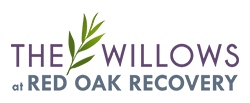People experiment with drugs and alcohol every day. While some drugs may seem more benign than others, drug use may be a sign of underlying mental health issues or unresolved trauma. For those living with unhealed trauma and undiagnosed mood disorders like anxiety and depression, drugs and alcohol provide an uncomplicated method of self-medication. For many women, social pressure, unresolved trauma, and expectations can lead to gateway drugs and other drug use. Our substance abuse treatment for women can help keep gateway drugs from addiction.
If you or a woman in your life is using gateway drugs, call The Willows at Red Oak Recovery® today. Our holistic drug addiction treatment center serves young women just south of Asheville, North Carolina. Call us today at 828.518.6941 to learn more about holistic women’s addiction treatment programs.
Are Gateway Drugs a Myth?
Drug prevention programs in schools often discuss gateway drugs. Many think gateway drugs are a myth. However, gateway drugs are not a myth. The term “gateway drug” refers to a substance that can lead to the use of other, more harmful substances. While some may argue that this is just correlation and not causation, studies have shown that using certain substances can increase the likelihood of trying other drugs.
In the context of women’s drug use, gateway drugs can include alcohol, marijuana, and prescription medications. These substances may be seen as more socially acceptable or easily accessible, but they can still have serious consequences when abused. Additionally, using these substances can also increase the risk of developing a substance use disorder.
The key is to address any underlying issues that may lead to drug use and provide proper treatment for those struggling with addiction. This is where women’s drug addiction treatment programs come into play. By addressing the root causes of drug use and providing individualized care for women’s unique needs, these programs can help prevent gateway drugs from turning into full-blown addiction.
Young Women and Gateway Drugs
Young women may be particularly vulnerable to using gateway drugs due to social pressures and expectations. Society often puts pressure on young women to conform to certain beauty standards and behavior norms, which can lead to low self-esteem and body image issues. These feelings of inadequacy or insecurity can then make it more likely for young women to turn to substances as a coping mechanism.
Additionally, many young women may also have unresolved trauma from past experiences such as sexual abuse or emotional neglect. This trauma can manifest in various ways, including substance abuse as a form of self-medication. In these cases, addressing the underlying trauma is crucial in preventing drug use and addiction.
Most Common Gateway Drugs
Here are the most common gateway drugs:
Alcohol
Perhaps the most common gateway drug, alcohol, is often considered to be benign. Because alcohol is legal and easy to get, many people experiment with alcohol. As a depressant, alcohol slows the nervous system and impairs judgment. Alcohol is addictive, and many people begin using other drugs while drinking. Like other drugs, the more someone drinks, the more alcohol they will need for the same effect. This often leads to combining alcohol with cigarettes, marijuana, prescription painkillers, or cocaine and methamphetamines.
Cigarettes and Tobacco Products
It’s commonly known that cigarettes are addictive. Nicotine is a highly addictive ingredient in cigarettes that also produces the calm euphoria and decreased appetite cigarettes are known for. Like most drugs, when someone becomes addicted to nicotine, they have to smoke frequently to prevent withdrawal. For many, this leads to combining cigarettes with marijuana and alcohol for more potent effects.
Marijuana
Marijuana use is increasingly common. While people have used cannabis for centuries, new, more potent strains have made the THC in marijuana more addictive. Many cannabis products like Delt 8 are unregulated, meaning it’s hard to know what else is in an edible or vape pen. This can make cannabis products even more addictive. While many people don’t believe marijuana is addictive, people may become dependent on THC. The euphoric effects of cannabis can lead to other drug use.
Prescription Drugs
Prescription drugs are easily accessible and given to people every day. Benzos, Adderall, and opioid painkillers are common and addictive. For many people, a prescription for any of these drugs can lead to further drug use and combining pills with alcohol for a stronger effect.
Experimenting with drugs and alcohol is often a rite of passage in our country. Using gateway drugs can be experimentation. However, it can also be a sign of something else. Gateway drug use should always be taken seriously.
The Importance of Women-Centric Addiction Treatment
As mentioned earlier, unresolved trauma and underlying mental health issues often play a significant role in women’s gateway drug use. This is why it’s crucial for women to receive treatment that addresses their unique needs and experiences.
Women-centric addiction treatment programs provide:
- A safe and supportive environment for women to heal and recover
- Individualized therapy that addresses underlying issues such as trauma, self-esteem, and body image
- Gender-specific treatment methods that address the unique ways in which women experience addiction and recovery
- Support from other women who can relate to their experiences and provide encouragement during the recovery journey
By targeting these specific needs, women’s drug addiction treatment programs can effectively prevent gateway drugs from leading to more harmful substances and help individuals achieve long-term sobriety.
Start Addiction Treatment for Women Today at The Willows at Red Oak Recovery®
For many women, gateway drugs can provide stress relief and help them cope with trauma, anxiety, and depression. However, prolonged use or frequent use of gateway drugs can lead to illicit drug use and addiction. Unfortunately, young women tend to keep drug use and addiction to themselves. At The Willows at Red Oak Recovery®, we believe in creating a sanctuary where young women can heal together.
Our Asheville, North Carolina clinic provides dual diagnosis and addiction treatment specifically for women. With individual, group, and family therapy options, we provide treatment for addiction, disordered eating, and trauma.
If you or a woman in your life needs gender-specific addiction recovery help, call The Willows at Red Oak Recovery® at 828.518.6941 or reach out online.




